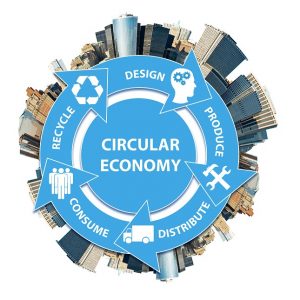ETIRA demands ‘fast action’ following EU’s Circular Economy report
August 5, 2020

The European Toner and Inkjet Remanufacturers Association (ETIRA) has issued an open letter to the EU, demanding ‘fast action’ to stop the ‘devastating impact’ the printing industry is having on the environment.

The letter, published on ETIRA’s website, responds to the EU’s Circular Economy report, stating that at present, consumers and small business owners are currently tied to buy expensive, environmentally damaging ink cartridge replacements from the Original Equipment Manufacturer (OEM), rather than being given the choice to reuse them time and again.
ETIRA is calling on the European Commission to end this cycle, banning chips and firmware updates, introducing a minimum number for reuse cartridges, and by stopping the import of cheap and polluting single-use cartridges from outside the EU.

Javier Martinez, president of ETIRA, said: “We need fast action to stop consumers and smaller business owners being held hostage by the big OEM’s.”
“A change in legislation would give consumers the freedom to choose the type of ink cartridges they purchase, putting environmentally friendly reuse cartridges on the table.”.
“It is hard to believe, but today you need 26 cartridges to print 10,000 pages vs just one cartridge 20 years ago!
“With green issues so high on the agenda across Europe we need to see legislation to help us in the printing industry work to reduce, remake and recycle – creating a circular economy in printing, in line with the EU’s Circular Economy Action Plan.”
The current printing business model has a devastating impact on the environment, creating huge waste due to the short life of the printing hardware, combined with single-use cartridges:
- Cartridges create 2.5% of total small and medium electronic appliances waste
- Both the Small Office (SOHO) and home printer repair rate is zero
- The average operating time for home printer usage is only five hours during its expected four years of operational life.
- The average total cartridge operating time is just 19 minutes
Javier Martinez added: “Sadly, buying a new machine is often cheaper than buying a new set of cartridges, meaning people throw away both the device and reusable cartridges. This has to stop.”
“We support the EU’s 2020 proposal for a Circular Economy. However, its current suggestion for a Voluntary Agreement for the printing sector can only be a real solution if it stops anti-cartridge reuse elements such as chips and firmware updates, creates a minimum number for reuse cartridges, and stops the invasion of cheap and polluting single use non-OEM cartridges from outside the EU. “
Martinez added: “We hope our open letter, agreed by all our members across the EU is effective in communicating this message and raising awareness of the urgent need for change”.
ETIRA believes there is a real opportunity for change. New legislation in this industry would see environmental improvements and generate up to 25,000 new jobs across Europe.
“There is so much good to be gained from changes to this sector and we want to see this pushed up the agenda and discussed,” concluded Mr. Martinez,
To read ETIRA’s open letter to the European Commission, click here
Tags
circular economyEU Circular Economy plan
printer cartridge reuse
An open letter to the European Commission, in response to the EU’s Circular Economy Report
July 31, 2020

When you buy a car, you are not told you can only fill it up at a certain petrol station – but when you buy a printer your hands are tied to the costly ink cartridge replacements sold by the manufacturer of the printer. This needs to change.
We are writing as the European Toner and Inkjet Remanufacturers Association (ETIRA), a non-profit organisation, representing the interests of the inkjet and toner cartridge remanufacturers.
In response to the welcome publication of the EU’s Circular Economy plan, we are calling for the EU to now take fast action against the way that printer manufacturers, who are for the most part based outside the EU, are holding consumers hostage to costly and environmental damaging replacements for their ink.
Our industry, a textbook example of Circular Economy, should be experiencing strong growth as we improve the European environment, provide savings for consumers, and create jobs. But the reality is that it is shrinking, and this is mainly due to the lack of a regulatory European framework facilitating cartridge reuse. The current EU approach, whereby printer manufacturers have only voluntary commitments to reduce the environmental impact of printing, (EU “Voluntary Agreement Imaging Equipment”, VAIE), has massively hindered cartridge reuse.
The current printing business model has a devastating impact on the environment, creating huge waste due to the short life of printing hardware combined with single-use cartridges mostly made from plastics. In addition to the single use cartridges from the printer manufacturers, there is an invasion of cheap non-OEM single use cartridges from Asia into Europe. Those cartridges may be a health and safety risk, because tests have shown that the chemicals and plastics used did not comply with minimum EU standards and are therefore not suitable for reuse or recycling.
According to the recent study commissioned by the EU (Task 1-7 assessment) on the deliverables of the last Voluntary Agreement:
- Cartridges create 2.5% of total small and medium electronic appliances’ waste
- Both the Small Office (SOHO) and home printer repair rate is zero
- The average operating time for home printer usage is only five hours during its expected four years’ life.
- The average total operational cartridge life is just 19 minutes
- Globally, the recovery thresholds for producers are far from being reached, and some OEM’s still incinerate 100 % (!) of what they recover
It is shocking to see that today you need 26 cartridges to print 10,000 pages vs. just one cartridge 20 years ago!
These increases in totally unnecessary plastic, metal, and other waste, in addition to the invasion of non-OEM single use plastic cartridges, must be stopped. Printer manufacturers should commit to implementing clear and measurable re-use objectives and targets. That is why we need an end to anti-cartridge reuse tactics such as chips and firmware updates that are blocking re-use cartridges, we need a minimum percentage reserved for reuse cartridges in the total number of cartridges placed on the EU market, and we need a full stop to the invasion of cheap and polluting single use non-OEM plastic cartridges from outside the EU.
ETIRA fears that it will be close to impossible for a Voluntary Agreement to achieve these objectives.
Especially in the current macro-economic situation, it is important to note that for printing, the remanufacturing industry does and will create jobs inside the EU: merely doubling the current rate of reuse would generate up to 16,000 – 20,000 additional jobs across the EU.
Now is the time for change. We need to see new legislation to reduce, promote preparation for re-use (e.g. remanufacturing) and raw material recycling – and thus create a circular economy in printing, in line with the Circular Economy Action Plan. The current original equipment manufacturer (OEM) printing business model is coercive to end users, wastes limited resources, and generates unnecessary waste. We want to see that changed.
Consumers should have freedom of choice, in line with the upcoming “right to repair and reuse” concept included in the EU’s Circular Economy Action Plan, instead of having their hands tied to one supplier. We know that the size of ink content and cartridges has decreased over time, while the price of printing is skyrocketing and that should not be allowed to continue.
We hear the stories of people buying a home printer, buying expensive ink cartridges and then finding that, when there is a problem with the printer, it is cheaper to just buy a new one that comes with new ink cartridges, rather than to repair the printer.
This has to stop. Our society cannot accept it. No other industry would accept this.

On behalf of all our members, businesses and consumers across Europe, we want to truly empower customer freedom of choice by facilitating true competition between OEM dealers and remanufacturers. Currently there is no freedom of choice and repair in the sector and no meaningful secondhand market.